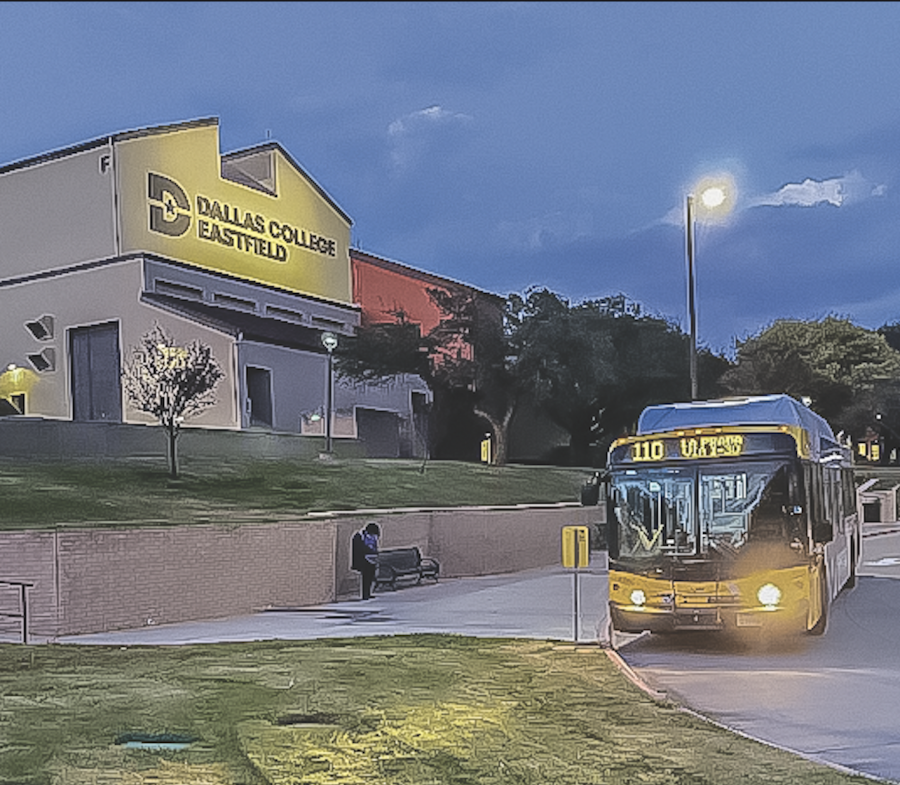Some students lack affordable transportation
A person sits at Eastfield’s DART drop-off location on Nov. 17. Photo by Adamaris Sanchez/The Et Cetera
November 30, 2021
Education major Carmen Cisneros spends $40 a week on Uber rides since she lost her only means of transportation this semester.
Cisneros was diagnosed with epilepsy as a child and can’t drive. When her mother had to make an emergency trip to Mexico about two months ago, her only option to get to Eastfield was the rideshare company.
Even though her mother has since returned, one of the family’s vehicles broke down and Cisneros has to continue relying on Uber.
Cisneros said she is using financial aid to pay for her classes, but her parents have to help with the Uber expense.
“When I don’t have money on my card or if something happens, I build courage and go straight to my parents,” Cisneros said. “I ask, ‘Can I have money for the Uber?’ … So now when they put money on my card, that’s when I can start taking the Uber again.”
Cisneros only lives 10 minutes away from campus, but she faces a common problem that Eastfield students living in Mesquite experience. Dallas College students can ride DART services for free, but Mesquite is not part of the DART system. Students like Cisneros have to find other options.
At a Nov. 10 meeting with student journalists, Chancellor Joe May said he knows transportation continues to be a problem for many college students, especially those who don’t have easy DART access.
College leadership was talking with local rideshare companies before the pandemic about the possibility of establishing a similar option for Dallas College students but May said the conversation stopped when the pandemic hit.
May said even students who have access to DART sometimes have to pay rideshare expenses, and a pre-pandemic survey of transportation costs showed some students were spending $40 to $50 per day just to get to a DART location.
“DART is last mile, not first mile, even under the best circumstances,” May said.“Everybody’s got to do something to get to a station or stop.”
Dallas College is currently conducting a transportation survey to find out more about students’ transportation needs. Students can participate in the survey using the link blog.dallascollege.edu/2021/11/transportation-survey-2021.
Tracie Lowe, dean of student success research, told The Et Cetera in an email that administrators will use the results to discover what changes are needed to improve students’ access to transportation.
“Access to reliable transportation … often impacts student success and persistence in college,” Lowe said. “[The] college continues to seek student input on the institution’s services to students because their voice is necessary.”
Students who do have DART access can find out more information on how to apply for a DART pass at dallascollege.edu/gopass.Disabled students living outside of Mesquite in DART service areas could benefit from DART’s paratransit services. Forcurb-to-curb service, students can use DART GoLink.
May said the board of trustees is also discussing the establishment of Welcoming Centers on campuses where the DART buses can unload and provide support for students with long-distance commutes.
“[We’re trying ] to create kind of a central place that you’re not just dropped off at the back of a campus, but really that folks coming in through public transportation are welcomed,” May said. “That’s going to be kind of a centerpiece of what we do in the future.”



